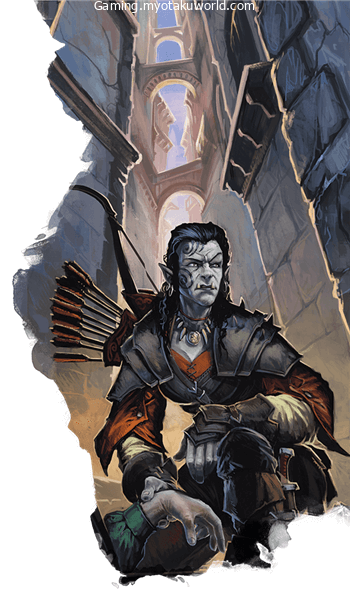A few years ago, when I made my first Rogue with a subclass, I looked at an Assassin 5e guide. Assassin is still my favorite Rogue class, as it is for many others.
Even though Arcane Trickster and Swashbuckler can change things up, I still go with Assassin when I don’t know which archetype to pick. It’s so solid, and it always does the most damage.
Assassin 5e stats
- Armor class: 15
- Hit Points: 78
- Hit Dice: 12d8
- Hit Points Roll: 12d8+24
- Speed: Walk 30 ft.
- Strength: 11
- Dexterity: 16
- Constitution: 14
- Intelligence: 13
- Wisdom: 11
- Charisma: 10
- 3rd level – proficiency with the disguise kit and poisoner’s kit
- 3rd level – advantage on creatures that haven’t attacked, plus crits to surprised creatures
- 9th level – create new identities
- 13th level – copy others’ speech, writing, and behavior
- 17th level – do double damage to the next creature of you get a surprise attack off
Traits
- Skills Saving Throw: DEX +6, Saving Throw: INT +4, Acrobatics +6, Deception +3, Perception +3, Stealth +9
- Senses Passive Perception 13
- Languages Thieves’ cant plus any two languages
- Challenge 8 (3900 XP)
I don’t have as much time to read whole guides as I get older. This quick reference will give you most of the information you might need about the DnD 5e Assassin.
This is everything you need to know about the Rogueish Archetype Assassin to get started. With Assassin, you can make your own unique disguises later on, but it’s best feature is available right away.
The fact that you can change your appearance quickly and hit first and hard makes you a time bomb that can go off at any time. I’ve killed more monsters in one shot as a Rogue Assassin than with any other class.
Special Abilities
Assassinate: The assassin gains an advantage on attack rolls against any creature that hasn’t taken a turn during its first turn. Any hit the assassin scores against a surprised creature is a critical hit.
If the assassin is subjected to an effect that allows it to make a Dexterity saving throw to take only half damage, the assassin instead takes no damage if the saving throw succeeds and only half damage if it fails.
Sneak Attack (1/Turn): The assassin deals an additional 13 (4d6) damage when it hits a target with a weapon attack and has advantage on the attack roll, or when the target is within 5 feet of an ally who isn’t incapacitated and the assassin doesn’t have disadvantage on the attack roll.
Actions
Multiattack: The assassin makes two shortsword attacks.
Shortsword: Melee attack, +6 to hit, 5 feet range, one target, melee weapon. Hit: 6 (1d6+3) piercing damage, and if the target fails a DC 15 Constitution saving throw, they take 24 (7d6) poison damage. If they succeed, they only take half as much damage.
- Attack Bonus: 6
- Damage: Piercing, Poison
- Damage Dice: 1d6+3, 7d6
Light Crossbow: Ranged Weapon Attack: +6 to hit, range 80/320 ft., one target. Hit: 7 (1d8+3) piercing damage, and if the target fails a DC 15 Constitution saving throw, they take 24 (7d6) poison damage. If they succeed, they only take half as much damage.
- Attack Bonus: 6
- Damage: Piercing, Poison
- Damage Dice: 1d8+3, 7d6
Rogue Assassin 5e

If you do have time and want to know as much as you can about the Rogue Assassin, I can help. My favorite Dungeons and Dragons 5e class is the Rogue Assassin.
Bonus Proficiency
When you choose Assassin as your class, the first thing you get is skill with the disguise kit and the poisoner’s kit. Both of these kits fit well with the typical assassin’s plan, so having them is great.
A simple disguise can be made with the disguise kit. Your skills are only as good as what you add to your kit and how well you roll. You can make poison weapons or poison food with the poisoner’s kit.
Assassinate
This is why most of the time, Rogues choose the Assassin class. Because when you do that at 3rd level, you get an advantage on attack rolls against any creature that hasn’t had a turn yet.
You also make sure that every hit you make on a creature that is surprised is critical. The rules for whether or not a creature is surprised are set by the DM.
If you don’t try to shock them, they won’t be shocked. If not, it depends on the DM and how you roll.
Infiltration Expertise
Even though the 9th level seems far away, once you get there, things start to get interesting. With one week and 25 gp, you can make a whole new identity, including a history, a job, and even connections.
You can’t steal someone’s identity; the only thing you can do is make a new one. These can help you join secret societies, get into events, and find good deals at the market. It can also help if you want to hide who you are.
When you make an identity, other creatures won’t check to see if you’re not who you say you are unless you give them a reason not to believe you. They will just take you for who you are based on what they see.
Impostor
At level 13, you can copy how someone else talks, writes, and acts. You have to look at them for three hours before you can copy them perfectly. But if you make a mistake, people might start to doubt you.
When you try to be someone else, you get a bonus on any Deception check you make. So, when you make a Deception check to hide your identity, you roll twice and use the higher number.
Death Strike
By the time you reach the 17th level, you are a lot sneakier and better at using your hands. When you attack and hit a creature that is surprised, it has to make a Constitution saving throw (DC 8 + your Dexterity modifier + your proficiency bonus).
If it fails, the next creature you attack can take twice as much damage from you. Jump from one to the next, making critical strikes as you go. I can’t say how much fun this is.
Assassin Monster in 5e
- Armor Class – 15
- Hit Points – 78 (12d8+24)
- Speed – 30 ft
- Saving Throws – Dex +6, Int +4
- Skills – Acrobatics +6, Deception +3, Perception +3, Stealth +9
- Bonuses – Poison Resistance, Passive Perception 13
- Languages – Thieves’ Cant plus to languages
- Challenge – 8 (3,900 XP)
Ability Scores (baseline)
- STR – 11 (+0)
- DEX – 16 (+3)
- CON – 14 (+2)
- INT – 13 (+1)
- WIS – 11 (+0)
- CHA – 10 (+0)
The name of a monster in Dungeons and Dragons 5e is “Assassin.” The Monster Manual has the information. They are traditional assassins that someone hired, like a hitman.
They can be any race, and they are never “Good.” In this case, being an assassin is a job. Assassins are always hired because they want to make money, not because they want to kill for fun.
Assassinate
The assassin has the trait of being able to kill. On the assassin’s first turn, they have the upper hand when attacking players who haven’t attacked yet. Any hit you land on a creature that is caught off guard is also a critical hit.
Evasion
With Evasion, if an assassin has to make a Dexterity saving throw and would take half damage, they don’t take any damage. If they would take the full amount of damage, they only take half.
Sneak Attack
When the assassin hits a target with a weapon, it can do an extra 13 (4d6) damage once per turn if it has advantage or if the target is within 5 feet of an ally who isn’t incapacitated.
Multiattack
The assassin can use the action “multiattack” to make two shortsword attacks. There’s nothing else to it. The assassin can use their shortsword to attack and then use the same shortsword or another one to attack again right away.
Shortsword
The shortsword is a melee weapon that does 1d6+3 piercing damage and has a +6 chance to hit. It also does 7d6 poison damage. From early to mid-game, this poison damage is very strong.
The attack needs a Constitution saving throw of DC 15 to stop it. When the target fails, they take full damage. But if the goal is met, the target gets half. So, if you have a strong body, you can really fight back against the assassin.
Light Crossbow
If the assassin is far away, they can use their crossbow to attack. If they do, it has a hit chance of +6 and a range of 80/320 feet. When it hits, it does 1d8 +3 piercing damage and 7d6 poison damage.
Again, you need a DC 15 Constitution saving throw to avoid the attack. When the target fails, they take full damage. But if the goal is met, the target gets half. As you can see, the crossbow is a little bit stronger than the shortsword.
Non-Rogue Assassin

You can be a killer without also being a Rogue. But if this is true, you can do one of two things. You can either roleplay as an assassin and pick a background that fits, or you can make up your own class.
Background and Roleplay
You can be an assassin without being a Rogue if you have the right background and play the part well. There are a few background choices in the Basic Rules and other canon books that are clear choices.
The best choice is the Criminal/Spy. But if you can tell a good story, picking up something like the Urchin or Pirate can help. Let me tell you just a bit about my favorite choices for non-Rogue assassins.
- Criminal/Spy – pretty easy to understand. How this works is clear. One of the specialties can even be murder, which is what an assassin does. So, if you want to play vanilla D&D 5e, this is the best option.
- Urchin, one of my favorite backgrounds is this one. It is very complicated and fits well with a complicated history. The assassin build works well with Stealth and Sleight of Hand.
- Pirate: In 5e, Pirate is a class that is good at Deception checks. Most pirates will be willing to kill, so it is easy to see how they could become assassins.
Homebrew – Professional Assassin
With a homebrew, you can become an assassin through a background or a class. One of my favorite games is Professional Assassin. It’s a great background that gives players a lot to do.
Proficiencies
- Skill Proficiencies – Stealth, Deception
- Languages – Thieves’ Cant
- Tool Proficiencies – Disguise Kit or Poisoner’s Kit
- Equipment – A set of ordinary clothes, clothes for traveling, fine clothes, and a dark robe, all of which have a hidden pouch sewn into them. A pen with black, red, and invisible ink, as well as several sheets of paper. The money is 30 gp, and there is a secret compartment with 10 gp more.
The Rogue Assassin and the Professional Assassin are the same. They start out with a lot of gear and can choose between one of two features. The best thing about this assassin is that you can be any class.
Feature Choices
- You are a member of a group of killers, or guild. If you pay 10gp a month, the guild will give you free housing and protect you from warrants if you stay with them. Fines of up to 10 times your level in gold pieces are gone. You can roll a d4 if you are ever found guilty of a crime. On a 1, your guild will drop you. If you roll a 2–4, your guild will protect you. If you get kicked out, you can come back by paying 20 your level in gp.
- Alibi: You don’t join a guild. Instead, you work on your own. If you’re found guilty of a crime, you can pay someone to cover for you instead. You’ll have to give them 100gp. This feature can be used once every 1–4 weeks. If you pay double each time (for example, 200gp or 400gp) and add 1d2 weeks to the timer, you can use it as much as you want. DM can also make their own rules about this.
I like the Guild Membership way better, but you can do either one. The Guild membership costs money every month, but it gives you a lot in return. The Alibi is just what you need if you want to pay your way out of trouble.
FAQs
Is Assassin Good in DnD 5e?
I think the killer is a good person. The damage is worth everything, but it’s not very useful in combat because it only works on the first turn unless you’re very creative. Still, being able to make such great disguises is a very useful skill.
When was Assassin 5e Introduced?
The Assassin was made a Rogue Archetype in the Player’s Handbook. This means that it fits into the story perfectly and can be used in almost every campaign. Before 5e, the Assassin subclass wasn’t the same as it is now.
What to Max for Assassin in 5e?
I prefer to max Dexterity and Charisma for assassin when given a choice. Anything else is fairly futile and won’t work towards your cause. When it comes to skills, pay attention to Stealth.
What’s the Best Race for Rogue Assassin 5e?
There isn’t a best race for Rogue Assassin. However, I usually end up choosing a half-elf for the extra Charisma and versatility. If you like to stay hidden, Halfings are also a great choice. This gives you more chances to sneak attacks.
What is an Assassin’s Role in 5e?
The Assassin’s role is generally to attack first. If they can get a good first attack in, the damage will be insanely higher. Taking them out one by one could save lives if you’re facing a mob.









